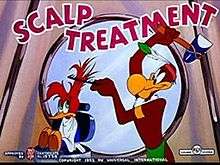Scalp Treatment
Scalp Treatment is the 42nd animated cartoon short subject in the Woody Woodpecker series. Released theatrically on September 18, 1952, the film was produced by Walter Lantz Productions and distributed by Universal International.[1]
| Scalp Treatment | |
|---|---|
 | |
| Directed by | Walter Lantz |
| Produced by | Walter Lantz |
| Story by | Don Patterson Walter Lantz |
| Starring | Grace Stafford Dal McKennon |
| Music by | Clarence Wheeler |
| Animation by | Ray Abrams Don Patterson Laverne Harding Paul J. Smith |
| Backgrounds by | Fred Brunish |
| Color process | Technicolor |
Production company | |
| Distributed by | Universal International |
Release date | September 18, 1952 |
Running time | 6' 25" |
| Language | English |
Plot
In a long shot of an Indian village way out West, all of the tepees have TV antennas, and some of the tepees are shops displaying Indian-made wares and merchandise. In the foreground is a millinery shop with a window full of feathered hats and coats, etc.; in the rear is a barber shop, complete with revolving barber pole. We discover Woody Woodpecker in the barber's chair reading a magazine, with Indian barber Buzz Buzzard stropping the blade of a tomahawk. Buzz tests the blade's sharpness by dropping a feather, which lands on the blade and slowly splits into two parts, each part floating in the air. Buzz trims the feathers on Woody's head, then, with "Feather Tonic," he gives Woody a vigorous scalp massage which, when finished, gives Woody's head the appearance of an Indian headdress, beautiful to behold. At this time, they discover a cute Indian maiden looking in the window and admiring a feathered bonnet, so they both zip out of the shop and tip their feathers to the maid. She continues to admire the bonnet, which carries a "$2,000.00 Wampum" price tag. She first asks Woody to buy the bonnet, but he's broke; she then asks Buzz, who's also without the necessary funds. The maid, with scorn, turns up her nose and walks away, leaving the two rejected swains very dejected and alone. Buzz then suddenly spies the beautiful feather-do that Woody has and, in a vision, dreams how it would look if transferred to the maid. With a malicious grin on his face, Buzz pulls out his tomahawk and starts for Woody, intending to acquire Woody's feather bonnet for the maid. From here on, there's a fast series of gags, with Buzz determined to get the feathers and Woody avoiding him at all times. Woody finally disposes of Buzz. In the final scene, we see Woody, his feathers all gone, now adorning the Indian maiden; Woody is stripped but happy.
Notes
- Scalp Treatment was Walter Lantz's final effort as director; he would continue to produce the remaining entries until the end of the series in 1972. He does not receive on-screen credit.
- Scalp Treatment marks the first occasion Dal McKennon provided any dialogue for Buzz Buzzard, albeit off-screen (he says the brief line, "No got wampum!", in an unusually deep voice). It is the first line of dialogue Buzz spoke since McKennon took over the role from original actor Lionel Stander (who was forced from the role in 1951 when he was blacklisted). McKennon, who performed his vocal effects for the past year, would provide Buzz's talking voice regularly beginning with the next entry, The Great Who-Dood-It.
References
- Lenburg, Jeff (1999). The Encyclopedia of Animated Cartoons. Checkmark Books. pp. 157–158. ISBN 0-8160-3831-7.
- Cooke, Jon, Komorowski, Thad, Shakarian, Pietro, and Tatay, Jack. "1952". The Walter Lantz Cartune Encyclopedia